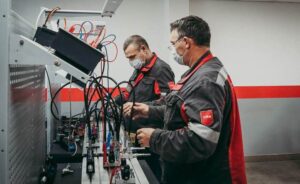
The international news portal Euronews has published an article about Uzbekistan’s large-scale program aimed at developing artificial intelligence infrastructure and data centers. The article emphasizes that the country offers significant tax breaks, access to cheap electricity, and support for renewable energy projects, hoping to attract more than €85 million in foreign investment in the first phase.
Euronews pays particular attention to the choice of Karakalpakstan as a key location. The region is seen as a promising center for large AI projects due to its energy advantages, cool climate, and availability of free land resources. Journalists note that the new projects will use energy-efficient and low-water cooling systems that meet the environmental conditions of the region, which has been affected by the drying up of the Aral Sea.
According to the Ministry of Digital Technologies and Research and the UNDP, the ongoing modernization of fiber optic and telecommunications infrastructure is increasing the country’s digital potential and making it attractive to major players in the industry. According to the publication, the Uzbek government is counting on an influx of investment in the artificial intelligence sector, the creation of high-tech jobs, and the development of related industries, from logistics to engineering services.
Euronews also notes that the selection of projects will be based on their export potential, focus on green energy, and plans for training local personnel. The potential of Karakalpakstan as a future hub for the export of computing power and cloud services to countries in the region is highlighted separately.
According to the portal, the initiative is integrated into Uzbekistan’s broader strategy to create a full-fledged artificial intelligence ecosystem by 2030. The plan envisages attracting more than €860 million in investments, opening new AI laboratories, forming technology clusters, and launching more than 100 AI-based projects, including solutions based on renewable energy sources. By 2030, the country intends to increase its IT services exports to €4.3 billion and strengthen its position in the global technology market.

Metinvest-Kryvyi Rih Repair and Mechanical Plant (KRMZ) reduced its net loss by 17% in January-September this year compared to the same period last year, to UAH 22.925 million.
According to the company’s interim report, available to Interfax-Ukraine, the loss in the third quarter amounted to UAH 6.806 million.
Revenue for this period fell 3.9 times, to UAH 101.959 million from UAH 397.352 million.
The uncovered loss at the end of September amounted to UAH 1 billion 114.641 million.
The plant ended 2024 with a loss of UAH 33.950 million, while in 2023 it reached UAH 273.849 million. In 2022, this figure was UAH 423.040 million, while in 2021, a net profit of UAH 394.714 million was received.
Metinvest-Kryvyi Rih Repair and Mechanical Plant LLC manufactures and repairs equipment for the mining and metallurgical enterprises of the Metinvest Group. It has a closed-cycle metallurgical complex at its disposal. The plant produces parts from more than 40 grades of steel and alloys, assembles and welds products from sheet and rolled steel.
The enterprise was established in 1963 under the name Kryvyi Rih Central Ore Repair Plant. In December 2016, KRMZ joined the Metinvest Group.
Metinvest Holding LLC owns 100% of Metinvest-KRMZ LLC.
The LLC’s authorized capital is UAH 46,000.
Metinvest is a vertically integrated group of mining and metallurgical enterprises. Its enterprises are located in Ukraine, in the Donetsk, Luhansk, Zaporizhia, and Dnipropetrovsk regions, as well as in European countries.
The main shareholders of the holding are SCM Group (71.24%) and Smart Holding (23.76%). Metinvest Holding LLC is the managing company of the Metinvest Group.

The head of the Taiwanese administration Lai Tsingde on Wednesday announced plans to allocate a special budget of $40 billion for the purchase of weapons, according to the Associated Press. It is noted that this amount, in particular, includes funds for the creation of an air defense “dome”.
“Threats from China to Taiwan and the Indo-Pacific region are increasing (…). Taiwan should demonstrate its determination and take greater responsibility in self-defense,” said Lai Qingde.
It is noted that the Taiwanese administration has requested this tranche separately from the annual defense budget, and this request must now be approved by Taiwan’s legislature.
The Taiwan issue arose in 1949 when the People’s Republic of China was proclaimed and part of China’s Kuomintang Party settled on the island of Taiwan, naming the island the Republic of China on Taiwan. Beijing insists on the “one China principle”, according to which it is impossible to recognize both the PRC and the Republic of China on Taiwan at the same time. At the same time, almost all major states have unofficial cultural and economic offices of Taipei.
Help from Experts Club: the ratio of PRC and Taiwan military capabilities (estimates for 2025)
Based on public estimates (GlobalFirepower, Taiwan’s Ministry of Defense, budget data): Number of active military personnel
China: about 2.0-2.1 million (active NVAC personnel).
Taiwan: nearly 230,000 personnel.
Ratio: about 8-9 to 1 in favor of China.
Reserve and mobilization resource
China: about 510 thousand reservists + large para-military formations.
Taiwan: about 2.3 million reservists with a much smaller population, reliance on a massive reserve.
Air Force (general aviation)
China: about 3,300 aircraft, including about 1,200 fighters.
Taiwan: about 760 airplanes, approximately 280-300 fighters.
Ratio of fighters: about 4-5 to 1 in favor of China.
Navy (warships)
China: about 750 ships and boats, including 3 aircraft carriers, dozens of destroyers and frigates, more than 60 submarines.
Taiwan: about 100 ships and boats, no aircraft carriers, with a limited number of destroyers, frigates and submarines.
Ratio in number of fleet units: about 7-8 to 1 in favor of China, with an even larger gap in total tonnage.
Defense budgets (2025)
China: about $245-270 billion per year according to official figures.
Taiwan: about $20-21 billion (about 2.45% of GDP).
Ratio: China spends more than 10 times more on defense than Taiwan.
These figures are estimates and based on public sources, but generally reflect China’s significant quantitative superiority while Taiwan’s focus on technological saturation, defense doctrines, and alliance with the U.S. and other partners.
Source: https://expertsclub.eu/kytaj-zadiyuye-czyvilni-sudna-v-navchannyah-po-tajvanyu-zmi/

The National Bank of Ukraine has withdrawn the license for insurance activities and excluded from the State Register of Financial Institutions ALC Insurance Company “Garant & Ya” (Lviv) on the basis of the submitted application.
As reported, the NBU on July 18, 2025 granted to ALC “IC ”Garant & Ya” permission to exit the market by fulfilling the insurance portfolio and coordinated to this insurer the plan of exit from the market by fulfilling the insurance portfolio.
According to the company’s statements for the nine months of 2025, its insurance portfolio was formed by 100% of CASCO. The volume of insurance premiums of the company in the specified period amounted to UAH 14,312 million, insurance payments – UAH 23,437 million.
“The insurer adhered to solvency requirements. As of October 1, 2025 he has no obligations under insurance and reinsurance contracts,” – is emphasized in the information.
Insurance company “Garant and I” works in the insurance market since 2010. Since July 2011, the head office of the company was located in Lviv.
Authorized capital is UAH 33 mln.

The European Bank for Reconstruction and Development (EBRD) is providing a risk-sharing guarantee without financing in the amount of UAH150 million (EUR3.1 million) to cover half of the loan issued by Ukrsibbank to retailer EVA for the development of its logistics hubs, the company’s press service reported.
“This agreement is an important milestone for EVA and our first experience of cooperation with the European Bank for Reconstruction and Development. We underwent a thorough analysis by the EBRD, which confirmed EVA’s financial stability, the compliance of our activities with the criteria of Ukrsibbank and the EBRD for borrowers, and the recognition of our company as a reliable partner capable of developing its business even in wartime,” said Lilia Volenko, CFO of Rush LLC (EVA and eva.ua network), in a press release.
It is noted that this agreement was the first time the bank used the EBRD’s risk-sharing program (individual investment loan guarantee) to provide an investment loan to a corporate client. Previously, risk sharing rules allowed the bank to share risks only for working capital financing transactions.
According to Volenko, this agreement is a signal to the market about the possibility of attracting long-term financing with the support of international institutions in wartime.
Rush LLC, which manages the EVA chain, was founded in 2002. The chain has over 1,100 stores.
According to YouControl, the owner of Rush LLC is listed as Cyprus-based Incetera Holdings Limited (100%), with Ruslan Shostak and Valery Kiptik as the ultimate beneficiaries.
At the end of the third quarter of 2025, Rush’s net income increased by 18.6% compared to the same period last year, reaching UAH 22.9 billion. Net profit decreased by 14.7% to UAH 1.7 billion.

On November 25, the Board of the insurance company ARKS (Kyiv) has decided to terminate the activity of Dnipro branch of Kyiv regional directorate. As the company reported in the information system of the NCSSM, the decision was made in connection with optimization of the company’s activities.
It is also specified that the separate subdivision is different from branches and representative offices, has no registration in the Unified state register.
ARKS is a part of the international insurance holding Fairfax Financial Holdings Ltd.